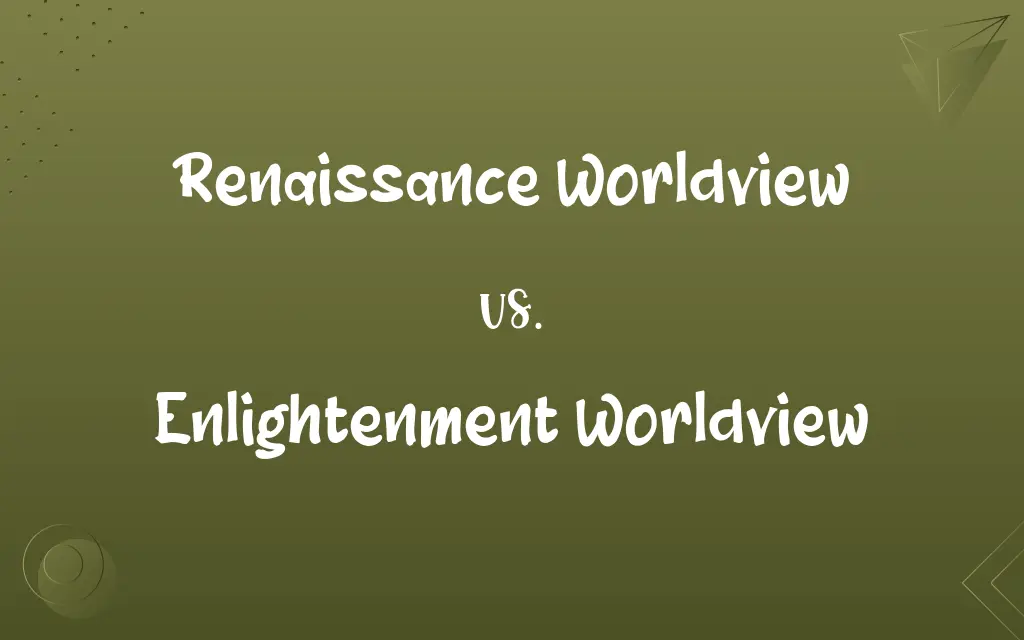Renaissance Worldview vs. Enlightenment Worldview: Know the Difference

By Shumaila Saeed & Hifza Nasir || Published on June 28, 2024
Renaissance highlighted classical revival, humanism, and individualism. Enlightenment stressed reason, scientific inquiry, skepticism of tradition, and advocated for progress, liberty.

Key Differences
During the Renaissance, which spanned from the 14th to the 17th century, there was a profound interest in rediscovering and revitalizing the knowledge, literature, and art of ancient Greece and Rome. The Enlightenment, emerging in the late 17th and flourishing through the 18th century, built upon Renaissance humanism but shifted the focus towards the power of reason as the primary source of knowledge and authority.
Hifza Nasir
Jun 28, 2024
Renaissance period highlighted humanism, the importance of individual achievement, and the potential for human beings to shape their own destinies and understand the world through direct observation and experience. The Renaissance laid the groundwork for the modern Western worldview, celebrating creativity, artistic expression, and exploration. Enlightenment thinkers advocated for the scientific method, empirical evidence, and rational thought to understand and improve the world. This era emphasized skepticism towards tradition, monarchy, and religion, promoting ideals such as liberty, democracy, and separation of church and state. The Enlightenment had a profound impact on political thought, leading to revolutions and the establishment of modern democratic institutions.
Shumaila Saeed
Jun 28, 2024
Both periods were transformative, but their worldviews differed significantly in their core emphases: the Renaissance revived classical antiquity through art and humanism, while the Enlightenment pushed for a rational and scientific approach to knowledge, society, and governance.
Shumaila Saeed
Jun 28, 2024
Comparison Chart
Key Emphasis
Revival of classical antiquity, humanism
Reason, scientific inquiry, skepticism
Shumaila Saeed
Jun 28, 2024
ADVERTISEMENT
View on Human Potential
Focused on individual achievement and potential
Emphasized rationality and empirical evidence as means to improve society
Shumaila Saeed
Jun 28, 2024
Approach to Authority
Questioned medieval norms, but maintained a balance with tradition
Advocated for challenging traditional authority, promoting liberty and democracy
Dua Fatima
Jun 28, 2024
Impact on Society
Led to advancements in art, exploration, and literature
Influenced political revolutions and the development of modern democracies
Shumaila Saeed
Jun 28, 2024
Philosophical Contributions
Humanism, individualism, exploration of the natural world
Rationalism, empiricism, social contract theory, separation of church and state
Hifza Nasir
Jun 28, 2024
Renaissance Worldview and Enlightenment Worldview Definitions
Renaissance Worldview
Emphasis on humanism.
Michelangelo's David celebrates human beauty and strength.
Shumaila Saeed
Feb 27, 2024
ADVERTISEMENT
Enlightenment Worldview
Advocacy for progress and liberty.
The American and French revolutions were inspired by Enlightenment ideals.
Hifza Nasir
Feb 27, 2024
Renaissance Worldview
Fusion of art and science.
Da Vinci's Vitruvian Man merges artistic beauty with scientific accuracy.
Hifza Nasir
Feb 27, 2024
Enlightenment Worldview
The birth of modern economics.
Adam Smith's The Wealth of Nations laid the foundations of economic theory.
Dua Fatima
Feb 27, 2024
Renaissance Worldview
Revival of classical learning.
Leonardo da Vinci's study of human anatomy inspired by ancient texts.
Hifza Nasir
Feb 27, 2024
Enlightenment Worldview
Skepticism towards traditional authority.
Voltaire's critiques of the church and state.
Shumaila Saeed
Feb 27, 2024
ADVERTISEMENT
Renaissance Worldview
Celebration of individual achievement.
Explorers like Columbus and Magellan embody the Renaissance spirit of discovery.
Hifza Nasir
Feb 27, 2024
Enlightenment Worldview
Empowerment through education.
The establishment of the Encyclopédie aimed to disseminate knowledge.
Shumaila Saeed
Feb 27, 2024
Renaissance Worldview
Renewed interest in Greek and Roman texts.
Petrarch's collection of Classical manuscripts sparked the studia humanitatis.
Shumaila Saeed
Feb 27, 2024
Enlightenment Worldview
Focus on reason and science.
Isaac Newton's laws of motion and universal gravitation.
Hifza Nasir
Feb 27, 2024
Repeatedly Asked Queries
Can the impact of the Renaissance and Enlightenment on contemporary culture be quantified?
While difficult to quantify, the impact is profound, influencing modern education, democratic principles, scientific inquiry, and cultural values around individualism and human rights.
Shumaila Saeed
Jun 28, 2024
Did the Enlightenment reject all aspects of the Renaissance?
No, the Enlightenment built upon Renaissance humanism by extending its focus on individual potential to include reason and scientific inquiry as tools for human progress.
Shumaila Saeed
Jun 28, 2024
What was the role of women in the Renaissance and Enlightenment worldviews?
In the Renaissance, women's roles were largely confined to the domestic sphere, though some, like Artemisia Gentileschi, gained recognition in the arts. The Enlightenment saw increased advocacy for women's rights and education, with figures like Mary Wollstonecraft arguing for gender equality.
Hifza Nasir
Jun 28, 2024
How did the Renaissance and Enlightenment influence modern science?
The Renaissance revived interest in natural philosophy and observation, setting the stage for the Enlightenment's emphasis on the scientific method and empirical research, foundational to modern science.
Shumaila Saeed
Jun 28, 2024
How did the Renaissance and Enlightenment views on religion differ?
The Renaissance embraced a human-centered approach to religion, focusing on individual spirituality and the beauty of religious art, while the Enlightenment often critiqued organized religion, advocating for tolerance and separation of church and state.
Shumaila Saeed
Jun 28, 2024
What is the legacy of the Enlightenment's skepticism towards authority?
This skepticism laid the groundwork for democratic governance, civil liberties, and the scientific skepticism that drives inquiry and innovation today.
Shumaila Saeed
Jun 28, 2024
In what ways did the Enlightenment worldview contribute to colonialism?
Enlightenment principles of exploration and rational classification were used to justify the expansion of European empires and the exploitation of colonized peoples, despite contradicting the era's ideals of liberty and equality.
Shumaila Saeed
Jun 28, 2024
What was the impact of the Renaissance and Enlightenment on art and literature?
The Renaissance revived classical forms and techniques in art and literature, focusing on humanism and realism. The Enlightenment encouraged artistic and literary works that critiqued society and politics, emphasizing satire, reason, and the questioning of traditional norms.
Dua Fatima
Jun 28, 2024
How did the concept of individualism evolve from the Renaissance to the Enlightenment?
The Renaissance celebrated individual achievement and artistic expression, while the Enlightenment expanded individualism to include the rights to think, speak, and act according to reason and conscience.
Hifza Nasir
Jun 28, 2024
How did the Renaissance and Enlightenment contribute to the development of universities?
The Renaissance revival of classical learning led to the foundation of new colleges focused on humanistic studies, while the Enlightenment's emphasis on reason and empirical evidence transformed universities into centers for scientific research and rational debate.
Hifza Nasir
Jun 28, 2024
Share this page
Link for your blog / website
HTML
Link to share via messenger
About Author
Written by
Shumaila SaeedShumaila Saeed, an expert content creator with 6 years of experience, specializes in distilling complex topics into easily digestible comparisons, shining a light on the nuances that both inform and educate readers with clarity and accuracy.
Co-written by
Hifza Nasir








































































